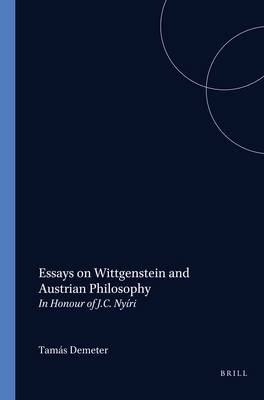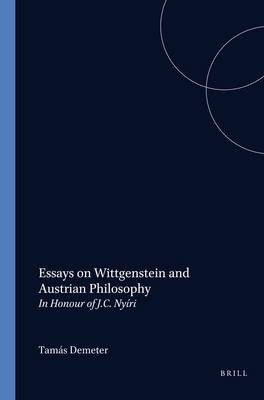
- Retrait gratuit dans votre magasin Club
- 7.000.000 titres dans notre catalogue
- Payer en toute sécurité
- Toujours un magasin près de chez vous
- Retrait gratuit dans votre magasin Club
- 7.000.0000 titres dans notre catalogue
- Payer en toute sécurité
- Toujours un magasin près de chez vous
Essays on Wittgenstein and Austrian Philosophy
In Honour of J.C. Nyíri
183,45 €
+ 366 points
Description
Essays on Wittgenstein and Austrian Philosophy is presented for the 60th birthday of professor Christoph Nyíri. The essays presented here for the first time are focused on Austrian intellectual history, and on Wittgenstein's philosophy - the two main areas of Professor Nyíri's interests. Typically, the contributors are outstanding scholars of the field, including among others David Bloor, Lee Congdon, Newton Garver, Wilhelm Lütterfields, Joachim Schulte, Barry Smith. The volume is of primary interest for Wittgenstein scholars and those studying the 19th and 20th century Austrian intellectual history.
As the volume is presented for Professor Nyíri, the papers collected here reflect his interests in Wittgenstein and Austrian philosophy. Beginning with an introductory chapter on Nyiri's achievements in this field of scholarship, the volume is in four parts. The first part contains essays on Austrian philosophy broadly understood, more precisely on its socio-historical context (Barry Smith and Wolfgang Grassl), on the relation between Marxism and Arnold Hauser's philosophy and sociology of art (Lee Congdon), and Neurath's connection to naturalistic epistemologies (Thomas Uebel).
The second part presents Wittgenstein's philosophy in context. Jaakko Hintikka's paper argues that Wittgenstein's probable dyslexia can be seen as an external influence on and a source of his philosophy. David Bloor discusses Wittgenstein's philosophy in the context of Edmund Burke's conservatism, which can be read as a background of Nyiri's influential interpretation of Wittgenstein as a conservative philosopher. Newton Garver also touches on the problem of conservatism while discussing passages of On Certainty in the context of Kant, Moore, and T.S. Eliot. Klaus Puhl's essay connects Wittgenstein's remarks on rule-following to Freud's concept of retroactivity, and argues that rules emerging from empirical regularities can be seen as retroactive constructions.
The papers in the third part of the volume offer close readings of Wittgenstein's works. Rudolf Lüthe offers two readings of Wittgenstein's criticism of philosophy in the Tractatus can be read in two ways with different consequences, among them is the appearance of philosophy inspired by art rather than the sciences. Joachim Schulte offers an interpretation of Wittgenstein's use of 'natural history' that can accommodate all of his remarks containing this concept. Herbert Hrachovec discusses the relation of pictorial and linguistic representations in Wittgenstein's Nachlass, arguing that there is no pronounced opposition between the two.
The forth part of the book, containing three papers in German, continues the close inspection of Wittgenstein's later works. Wilhelm Lütterfelds reconstructs Wittgenstein's philosophy of time as pointing out memory being the very source of time. Katalin Neumer inspects Wittgenstein's frequent references to photographs in the context of aspect-seeing and compares them with other remarks on theatre, painting, and music. She concludes that there are no philosophically important structural differences between them. Peter Keicher's paper offers a comprehensive view on Wittgenstein's prefaces in the context of his various book-projects.
The volume ends with a select bibliography of Professor Nyiri's works.
As the volume is presented for Professor Nyíri, the papers collected here reflect his interests in Wittgenstein and Austrian philosophy. Beginning with an introductory chapter on Nyiri's achievements in this field of scholarship, the volume is in four parts. The first part contains essays on Austrian philosophy broadly understood, more precisely on its socio-historical context (Barry Smith and Wolfgang Grassl), on the relation between Marxism and Arnold Hauser's philosophy and sociology of art (Lee Congdon), and Neurath's connection to naturalistic epistemologies (Thomas Uebel).
The second part presents Wittgenstein's philosophy in context. Jaakko Hintikka's paper argues that Wittgenstein's probable dyslexia can be seen as an external influence on and a source of his philosophy. David Bloor discusses Wittgenstein's philosophy in the context of Edmund Burke's conservatism, which can be read as a background of Nyiri's influential interpretation of Wittgenstein as a conservative philosopher. Newton Garver also touches on the problem of conservatism while discussing passages of On Certainty in the context of Kant, Moore, and T.S. Eliot. Klaus Puhl's essay connects Wittgenstein's remarks on rule-following to Freud's concept of retroactivity, and argues that rules emerging from empirical regularities can be seen as retroactive constructions.
The papers in the third part of the volume offer close readings of Wittgenstein's works. Rudolf Lüthe offers two readings of Wittgenstein's criticism of philosophy in the Tractatus can be read in two ways with different consequences, among them is the appearance of philosophy inspired by art rather than the sciences. Joachim Schulte offers an interpretation of Wittgenstein's use of 'natural history' that can accommodate all of his remarks containing this concept. Herbert Hrachovec discusses the relation of pictorial and linguistic representations in Wittgenstein's Nachlass, arguing that there is no pronounced opposition between the two.
The forth part of the book, containing three papers in German, continues the close inspection of Wittgenstein's later works. Wilhelm Lütterfelds reconstructs Wittgenstein's philosophy of time as pointing out memory being the very source of time. Katalin Neumer inspects Wittgenstein's frequent references to photographs in the context of aspect-seeing and compares them with other remarks on theatre, painting, and music. She concludes that there are no philosophically important structural differences between them. Peter Keicher's paper offers a comprehensive view on Wittgenstein's prefaces in the context of his various book-projects.
The volume ends with a select bibliography of Professor Nyiri's works.
Spécifications
Parties prenantes
- Editeur:
Contenu
- Nombre de pages :
- 336
- Langue:
- Anglais
- Collection :
- Tome:
- n° 38
Caractéristiques
- EAN:
- 9789042008885
- Date de parution :
- 01-01-04
- Format:
- Livre broché
- Format numérique:
- Trade paperback (VS)
- Dimensions :
- 155 mm x 235 mm
- Poids :
- 571 g

Les avis
Nous publions uniquement les avis qui respectent les conditions requises. Consultez nos conditions pour les avis.





